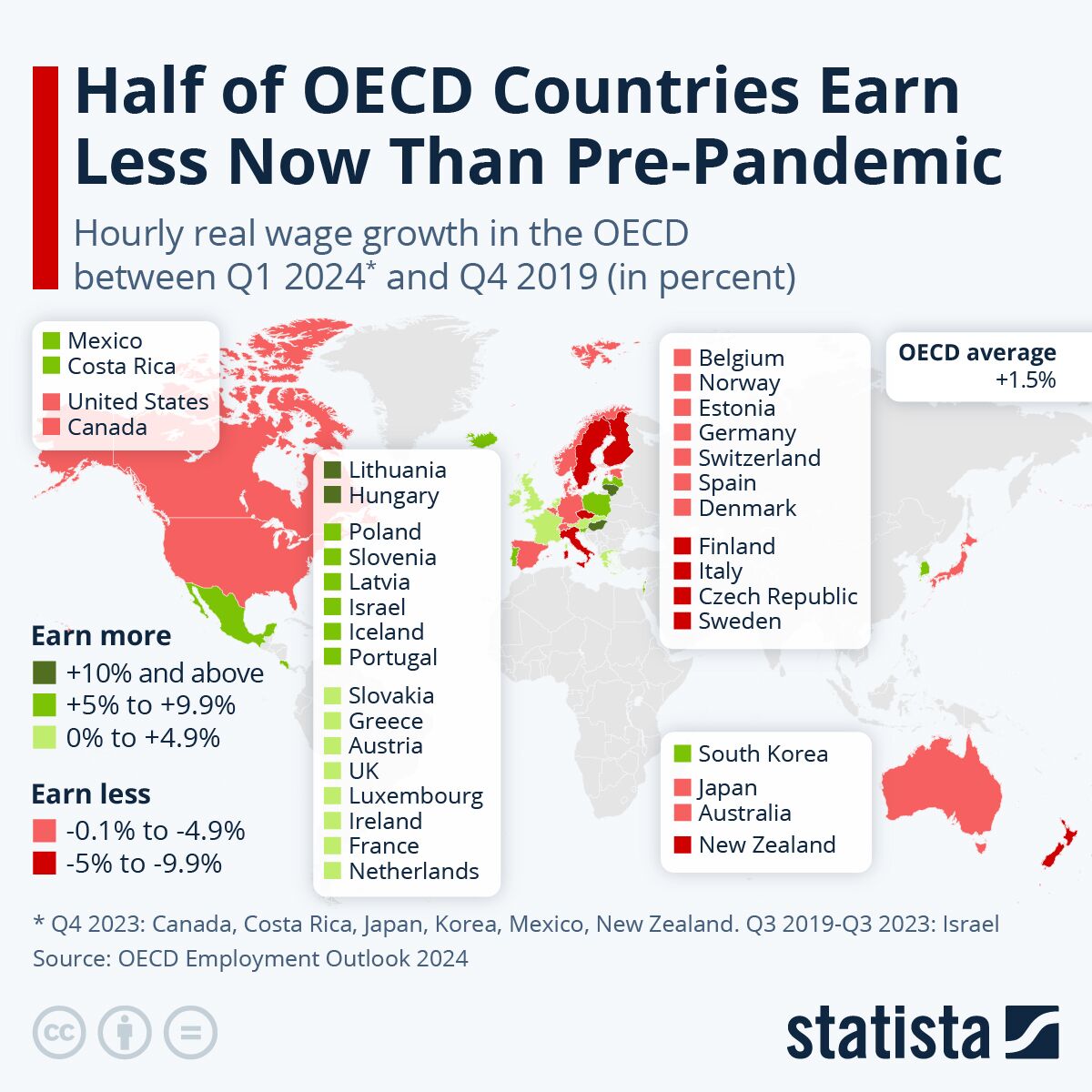Half Of OECD Countries See Real Earnings Decline Since Covid-19 Pandemic
A new report from the Organization for Economic Co-operation and Development (OECD) reveals a troubling trend: approximately half of its member countries have experienced a decline in real earnings since the Covid-19 pandemic began.

This earnings dip underscores the broader economic challenges many countries face, with inflation and shifting labor dynamics straining incomes and reducing purchasing power across the globe.
Pandemic’s lasting impact on real wages
The COVID-19 pandemic disrupted nearly every aspect of daily life, with significant consequences for financial stability.
While some sectors managed to thrive during the pandemic, leading to wage increases due to labor shortages, many others saw a drop in earnings.
However, the pandemic’s aftermath, compounded by soaring inflation, has eroded these gains, leading to a decline in real earnings across many OECD countries.
The situation worsened following Russia’s invasion of Ukraine in 2022, which triggered a sharp rise in inflation globally.
As prices for essential goods and services soared, wages struggled to keep pace with the rising cost of living.
This mismatch resulted in a net decrease in real income for a substantial portion of the population, exacerbating the financial strain on households.

Uneven impact across OECD countries
The OECD’s Employment Outlook 2024 highlights how these economic challenges have affected different member countries unevenly.
In particular, countries like Finland, Italy, the Czech Republic, Sweden, and New Zealand have seen significant declines in real wages, with reductions in some cases exceeding 5%.
Sweden, for instance, recorded a steep 7.5% drop in real earnings, reflecting a broader trend of diminished purchasing power among its workforce.
One factor contributing to this decline is the increasing tension in collective bargaining processes, especially in European countries like Sweden, where such negotiations are commonplace.
As economic conditions shift, the power dynamics between trade unions and employers have altered, potentially leading to long-term impacts on income distribution and labor rights.
Case studies: Sweden, the United States, and Australia
The OECD report also sheds light on the varied experiences of different countries.
The United States, for example, has managed to maintain relatively stable real wage levels, with only a 0.8% decrease in the first quarter of 2024 compared to pre-pandemic levels.
This resilience stands in contrast to neighboring Canada, where real wages fell by 2.4%, and Australia, which faced a more pronounced 4.8% drop in hourly real wages during the same period.
Australia’s struggle to sustain wage growth is partly attributed to its shift away from traditional industries such as manufacturing, coupled with changes in collective bargaining practices.
According to the University of Sydney, these structural shifts have had a significant impact on income levels and employment opportunities in the country, highlighting the need for targeted economic policies to support wage growth and financial stability.
Navigating wage dynamics in a post-pandemic world
The OECD’s analysis underscores the complexities of wage dynamics in the current global economic environment.
The pandemic has not only disrupted traditional wage growth patterns but also exposed systemic challenges that could have long-lasting implications for income inequality and economic stability.
For many countries, addressing these challenges will require a multifaceted approach.
Policymakers must consider the factors driving wage trends, such as inflation, shifts in labor market demand, and changes in collective bargaining practices.
Additionally, efforts to promote inclusive economic growth and improve financial well-being will be crucial in ensuring that the benefits of economic recovery are shared widely.
As the world continues to recover from the pandemic, understanding and addressing these wage dynamics will be essential for fostering sustainable economic growth and improving the quality of life for workers globally.
The OECD’s report serves as a critical reminder of the ongoing challenges and the need for proactive measures to support real wage growth in the years ahead.
More By This Author:
This Bitcoin price chart should cheer all of BTC bulls
Charles Hoskinson’s Cardano And The $11 Billion Crypto Ghost Chain
Gold Prices Surge To Record $2,490 Amid Geopolitical Tensions And Mixed Economic Signals
Disclosure: Invezz is a place where people can find reliable, unbiased information about finance, trading, and investing – but we do not offer financial advice and users should always ...
more


